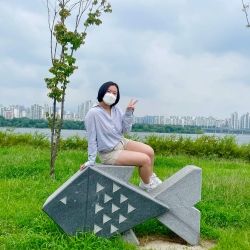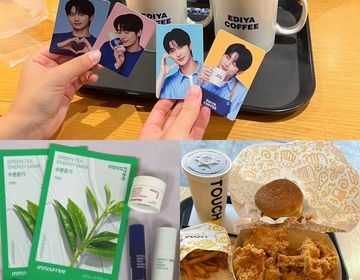What You Need To Know About the Korean Language Institute (Zoom Edition)
When I decided to study abroad in South Korea, I—like many people—wanted to improve my Korean language skills and work towards fluency. Being an avid language learner prior to my arrival, I knew I wanted to take the most intensive course available to me, which meant attending the Korean Language Institute or KLI for short. However, many people are not like me, and you may be unsure of which Korean class will suit you best. That's why I'm here to talk about my experience with the KLI program at Yonsei University.
For context, I previously did a year's worth of Korean language studies prior to coming to South Korea, but my classes were conducted over zoom. I had basic speaking abilities like communicating past, present, and future tenses, as well as important navigational and survival phrases. Additionally, I had two years of Mandarin Chinese under my belt, which helps when it comes to studying vocabulary. Korean is also the third language I've studied formally and intensively, which has allowed me to refine the best study methods for myself and know about basic linguistic grammar components. Now that you know my starting point, let's get into the course information you need.
KLI is an intensive Korean language class—with an emphasis on the intensive part. It awards six credits and meets every day, Monday through Friday. This semester (Fall 2021), all KLI levels meet from 4:00pm - 5:50pm with a 10-minute break from 4:50pm - 5:00pm. You will need to buy a total of 6 textbooks for the course that cost 82,000 won total. The class consists of instruction over zoom, daily homework, midterms that cover speaking, pronunciation, writing, reading, and listening, and final exams that cover the same topics as the midterm. Classes are taught in all Korean, even Level 1. For those not used to it (me), it can come as a shock and you may doubt your abilities, but eventually, it gets somewhat easier as you learn more Korean and pick up context clues. The textbooks are also written in all Korean, but there is a corresponding language pamphlet in the back of the book for some helpful translations. You will have the option to buy the textbooks with pamphlets in English, Mandarin, or Japanese. I've found the blue and pink pamphlets to be the most helpful.
First, you will register for classes. Yonsei University uses a bidding system where you are given a set number of points that you use to bid on different classes. Bidding more points increases your opportunity of getting into the class. That is Round One of course enrollment. After that, registration becomes first-come-first-served for remaining spots and for add-drop. Since KLI offers many levels and classes for their intensive Korean course, it is suggested that you either wait until Round Two to enroll or only bid 1 point during Round One.
PLACEMENT EXAM - The placement exam was conducted before classes began. Students enrolled with no prior Korean language experience were not required to take the exam and were automatically placed in Level 1. Students who opted to take the exam did so remotely. It consisted of a speaking portion where we recorded answers to the given questions and uploaded an audio file. There was then the paper exam that tested your reading and writing abilities. From what I experienced and heard from other students, the two long/essay questions carry the most weight in class placement. I didn't bother answering the last essay question as it was beyond my language capabilities, and I ended up getting placed in the Level 2 class.
I should note that it didn't seem like there were standardized criteria for your placement level. I and four friends from my home university took the exam. Those of us with the same amount of Korean language background got placed into very different levels than what we were actually comfortable with. Three of us had taken one year of Korean in college which is taught by the same professor every year. Two of us got placed in Level 2 and one in Level 1; however, my friend in Level 1 moved up a level and my friend in Level 2 moved down. My other two friends had done two years of Korean at our school, again with the same professor, but one got placed in Level 3 and the other in Level 2. My friend in Level 3 also dropped down to Level 2. I also had a handful of students in my Level 2 class move up to Level 3. Thus, take your placement exam results with a grain of salt.
WEEK AT A GLACE - As mentioned previously, classes meet every weekday. Mondays, Wednesdays, and Fridays are vocabulary and grammar days. The general pace is half a chapter or one lesson per class. One lesson consists of about 20 vocabulary terms and two grammar points. My class does the grammar exercises in the back of the blue textbook for homework each class, but I know other professors assign different things for homework. Tuesdays and Thursdays are speaking, listening, reading, and writing days. During class, we will do the listening, reading, and speaking exercises from the textbook. For homework, our professor picks one of the writing exercises for us to complete. We turn in our homework by snapping pictures and sending them to the professor via KaKaoTalk.
MIDTERM - Midterms were rough. We had a total of three full exam days. There were four parts: speaking, writing, reading, and listening. For speaking, we had two tasks 1) reading a passage aloud for pronunciation and 2) an interview with the professor for eight minutes. For writing, we had to a regular written exam and a short essay. For reading and listening, we logged into zoom and the professors would display questions/audio clips using a PowerPoint, and we'd have a set amount of time to jot down answers on an answer sheet. I ended up getting a C+ overall on my Korean midterms, which is very different from my typical test scores. I by no means slacked when it came to preparing for class or exams, but it is reflective of my overall Korean skills in the class.
STUDY METHODS - Korean was my hardest class. It was also the class I put the most effort into. Every day before class, I previewed the material that I think we'd get to cover. For example, on listening days, I'd do all the listening exercises before class to get the extra repetitions in. I also made and studied Quizlet sets daily. [ You can find my sets here and here ] Despite these large efforts I made to study, my Korean skills were a bit too low for the class. I firmly believe I should've dropped into Level 1 even if it would've been a bit slow or repetitive at the beginning.
As I am writing this, I am beginning to prepare for finals. I'm taking a bit of a different approach now that I am a bit more familiar with the exam process. I still prepare for classes by previewing and studying my Quizlet sets, but I'm taking advantage of CIEE's new Langauge Support sessions. Once a week, I go to the CIEE Center for an hour of tutoring which has been helpful. Additionally, when in class, I take every opportunity to speak and repeat written text. For example, when we take turns reading aloud, I turn my microphone off and read along with other students until it's my turn. Also on the second or third time that we listen to the audio tracks, I look at the script dialogues and read along. I think by doing these methods, I'll be better prepared for the final exams.
CONCLUSION - KLI is hard. I recommend that you drop down a level if you feel super challenged in the first couple of classes as it doesn't get much easier, especially if you're concerned about your GPA. For my college, I just have to pass the class with a C- or better to get the credits to transfer since my grades here won't affect my GPA. It's a lot of work, but there's some fun camaraderie, and you will learn a lot of Korean. I hope this all is insightful and helps you decide if KLI is right for you!
Related Posts
K-Pop Stan’s Guide to South Korea: 5 Must-Do Activities While Studying Abroad
By: Jacqueline Lee South Korea is the place to be as a kpop stan, so here are 5 activity ideas that you must do during your time abroad! 1. Collect... keep reading
Courses at Yonsei University—Difficulty, Planning & Advice!
If you're curious about the difficulty of college courses in South Korea, as well as course planning and advice, then this article is for you. In this blog, I delve into my courses at Yonsei University and offer helpful advice for course planning—tune in to learn more!
Fitting in with locals when you can’t speak the language
By: Raphael Li Coming to Seoul, there are so many different experiences you can have even as an exchange student. Some people make only exchange/international friends. Some students make many... keep reading



